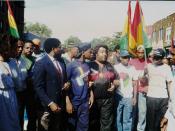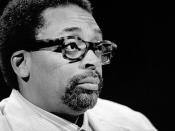"Jungle Fever"
LOVE SEES NO COLOR, BUT SEX DOES
After some breakthrough hits at the Box Office, with Sheôs Gotta Have It, Do the Right Thing and MoôBetter Blues, a young black filmmaker made a name for himself. Spike Lee. Mainly because he was an African American director who dared to speak up for his culture, but also found a way to suit the taste of the public. Today he is considered to be the ice breaker in the 80ôs for a lot of black director's success and the icon of populous black cinema. In dealing with social, racial and gender issues he always focused on controversial themes and grappled with clichés and stereotypes. On of his works, concerning these conditions, as well as its connections to early black cinema, is the subject in this paper.
Jungle Fever is Spike Leeôs authentic look at the legend about sexual attraction between black and white.
The film is not merely digging under the surface of stereotyping, it also deals with the ugly face of prejudice and intolerance. The audience beholds two people who tumble into a romance, and, which is at last tragically chained with the breakdown of their affair, their surrounding.
Flipper, a highly graduated architect from uptown New York, obviously lives in a perfect marriage with his wife and a little daughter. A black family, that is completely functioning at the beginning of the movie. We also get to know Flippers brother Gator, who lives at the other end of the rope as a drug addicted crack-junkie and their parents. Both are as lucky with Flipper, as they are desperately in anger about Gator. Things start to run mad when Angie, an Italian-American woman living in the suburbs of the Big Apple, steps into Flippers life. Not like...


